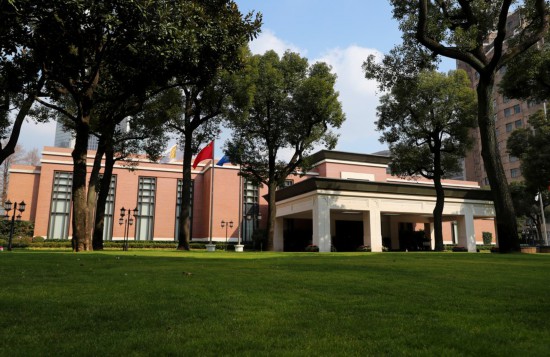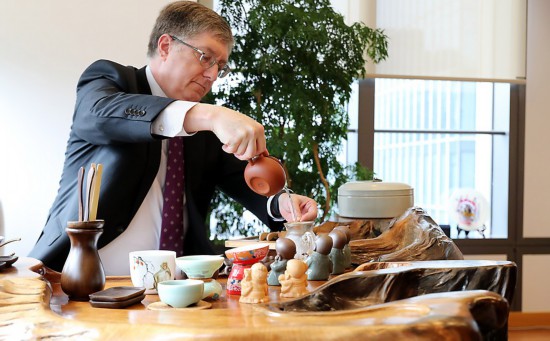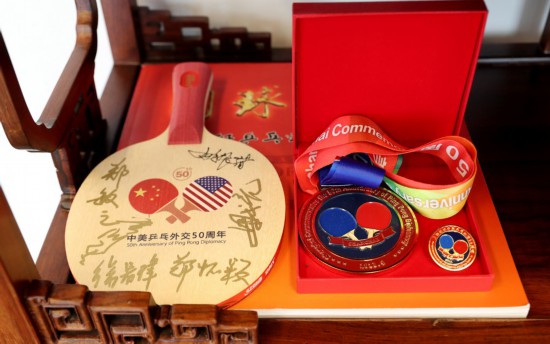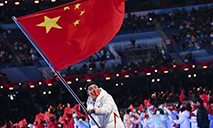Five decades on, Shanghai Communique still resonates among Chinese, Americans
Looking back on the past, experts have observed that the normalization of China-U.S. ties has brought enormous benefits to both peoples and the rest of the world, opening a new chapter in China-U.S. relations.
Jeffery Lehman, vice chancellor of New York University (NYU) Shanghai, still remembered that a Chinese ping-pong team paid a visit to the United States in April 1972, mentioning that ping-pong and pandas left a good first impression of China on him.
Fifty years later, the most striking significance of the Shanghai Communique is that China and the United States, despite huge differences, should be able to seek common ground while shelving differences, so that bilateral relations can move forward, an expert said.
SHANGHAI, Feb. 26 (Xinhua) -- Half a century ago, then U.S. President Richard Nixon landed in Beijing for a historic visit to the People's Republic of China since its founding in 1949, opening what he called a "week that changed the world."
It was on Feb. 28, 1972, as Nixon was about to wrap up his ice-breaking visit, that the Shanghai Communique was issued, a historic document that became the political foundation for the two countries to establish diplomatic ties.
Looking back on the past, experts have observed that the normalization of China-U.S. ties has brought enormous benefits to both peoples and the rest of the world, opening a new chapter in China-U.S. relations.

Photo taken on Feb. 23, 2022 shows the hall of Jin Jiang Hotel in east China's Shanghai. (Xinhua/Fang Zhe)
HISTORIC VISIT WITH POLITICAL WISDOM
The Shanghai Communique was released in the hall of Jin Jiang Hotel in the eastern Chinese municipality of Shanghai.
He Zhaofa, a former receptionist at the hotel, still has a vivid recollection of how he and his colleagues greeted Nixon 50 years ago.
At that time, there were wide divergences between China and the United States, the 85-year-old man said. "Though the two countries differ in political systems, the two peoples are friendly," he said.
In frigid February, staff members of the hotel served the U.S. representatives with warm tea during their stay, he said.
Photos taken at that time showed Chinese tea was a common sight on such occasions as at a banquet or in a carriage. In Chinese culture, presenting guests with tea represents mutual respect and peaceful co-existence.

Jeffery Lehman, vice chancellor of New York University (NYU) Shanghai, makes tea at his office in east China's Shanghai, Feb. 16, 2022. (Xinhua/Fang Zhe)
Jeffery Lehman, vice chancellor of New York University (NYU) Shanghai, still remembered that a Chinese ping-pong team paid a visit to the United States in April 1972, mentioning that ping-pong and pandas left a good first impression of China on him.
"I happened to love table tennis as a teenager, and my father took me to see an exhibition performed by these incredible players, which was very moving for me, and very important for me," he said.
Lehman, who had spent most of the past 10 years living in Shanghai, said the continuous exchanges between the two countries over the past 50 years were remarkable.
Recently, Lehman was named an honorary citizen of Shanghai for his contributions to helping build the first China-U.S. joint university, NYU Shanghai. He said the university is a result of fruitful cooperation yielded according to the spirit of the communique.

Items commemorating the 50th anniversary of "Ping-Pong Diplomacy" are displayed at the office of Jeffery Lehman, vice chancellor of New York University (NYU) Shanghai, in east China's Shanghai, Feb. 16, 2022. (Xinhua/Fang Zhe)
EXPANDING COOPERATION
In the Shanghai Communique, the two sides agreed that it is desirable to broaden understanding between the two peoples. To this end, they discussed specific areas in such fields as science, technology, culture, sports and journalism, in which people-to-people contacts would be mutually beneficial.
Tong Shijun, chancellor of NYU Shanghai, said he was surprised to hear English audio lectures set up by China National Radio soon after Nixon's visit, adding that audio lectures in other languages such as French and Japanese were also launched.

Tong Shijun (1st L), chancellor of New York University (NYU) Shanghai, talks to students at the campus of NYU Shanghai in east China's Shanghai, Feb. 16, 2022. (Xinhua/Fang Zhe)
The opening-up in the 1970s has brought about more than a foreign-language learning fever. The communique mentioned that China and the United States viewed bilateral trade as another area from which mutual benefit could be derived, and agreed that economic relations based on equality and mutual benefit are in the interests of the people of the two countries.
Shortly after Nixon's visit, Cargill, a U.S. agriculture and food company, carved out a new business niche in China.
At the Fourth China International Import Expo held in Shanghai in November 2021, Cargill said that after 50 years of development in China, the company now has about 10,000 employees serving the Chinese market.
Cargill has always supported open trade, because it is not only in the interests of business, but also for the sustainability of the world, said Marcel Smits, chairman of Cargill Asia Pacific.

Photo taken on Nov. 5, 2020 shows a hamburger made of "vegetarian meat" at the booth of U.S.-based agriculture and food company Cargill at the Food and Agricultural Products exhibition area during the third China International Import Expo (CIIE) in Shanghai, east China. (Xinhua/Chen Yehua)
During Nixon's visit, Steven Lien, now president of Honeywell China and Aerospace Asia Pacific, was invited by the Chinese government to recommend the best enterprises from 10 sectors to drive economic exchanges between the two countries and accelerate China's modernization development.
"Honeywell UOP was the only company in the field of refining and petrochemicals selected and recommended to the Chinese government," Lien told Xinhua in a written interview.
"Thanks to the economic cooperation and exchanges between China and the United States, Honeywell has been participating in China's economic development and promoting technological innovation and industrial upgrading together with our Chinese partners," Lien said.
Chen Dongxiao, president of the Shanghai Institutes for International Studies, said the Shanghai Communique emphasized the mutual benefits from substantial exchanges in such important sectors of China-U.S. relations as economy, culture, sports, science and education.
Both sides need to work hard to maintain these achievements at a time when the world is gripped by turbulence and change, Chen said.
FACING THE FUTURE TOGETHER
Being the first U.S. company to enter China in the 1970s, Coca-Cola has prided itself in taking the lead in serving the vast number of Chinese consumers.
In March, the beverage company will debut in China its first limited-edition product, Coca-Cola Starlight, along with its new global innovation platform, Coca-Cola Creations.
In recent years, based on research and development by the Chinese team, the company has offered a wide range of tea beverages, including black tea, green tea, oolong tea, and even "Dahongpao," a black tea of unique quality.

A worker transfers goods at the Swire Coca-Cola Beverages Hubei Limited in Wuhan, central China's Hubei Province, March 24, 2020. (Xinhua/Xiao Yijiu)
"Everyone is talking about the pause in the relationship, the way in which things have become more strained in the last five years, but I am an optimist and I believe that this is just a pause and that we will sort this out, because the people of the two countries worked very well together," Lehman said.
Wu Xinbo, director of the Center for American Studies of Fudan University, said it is important for the two sides to seek common ground while shelving differences.
Fifty years later, the most striking significance of the Shanghai Communique is that China and the United States, despite huge differences, should be able to seek common ground while shelving differences, so that bilateral relations can move forward, Wu said.
Despite the huge challenges facing China-U.S. relations, maintaining exchanges in the fields of culture, science, education as well as economy and trade is an important foundation for preventing bilateral "decoupling," many experts said, adding that if the two sides would decouple in these areas, confrontation and conflict would become more inescapable.
Over the past 50 years, the improvement and development of China-U.S. relations have made important contributions to world peace, development and governance, said Wu.
Looking to the next 50 years, Wu said the importance of China-U.S. relations will become more prominent, as the world needs a stable and cooperative China-U.S. relationship to promote regional and world peace, boost the global economy and lead global governance. Enditem
(Xinhua reporters Sun Ding, Liu Pinran and Tan Yixiao in Washington also contributed to the story.)
Photos
Related Stories
- US called on to match its words with action in ties
- Fifty years after Nixon's visit, US businesses urge 'continued cooperation' with China
- China to sanction US weapons firms over arms sale
- Nixon's 1972 visit to China: What happened 50 years ago and why it matters today
- MOC: US claims against China groundless, inconsistent
Copyright © 2022 People's Daily Online. All Rights Reserved.










